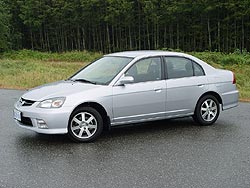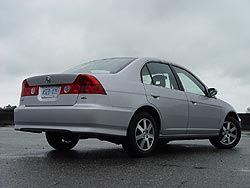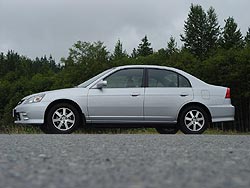 2004 Acura EL Touring. Click image to enlarge |
|
Related articles on Autos
Manufacturer’s web site
|
By Chris Chase; photos by Greg Wilson
As Canadians, we’re unique: we eat beaver tails, we put images of wild animals on our coins and we all live in igloos (well, according to some Americans, at least). Honda’s Acura division gave us another reason starting in 1997 – one that actually makes some of our neighbours south of the border a little jealous.
The 2001 Acura 1.7EL was the second generation of the entry-level model in Honda’s upscale brand’s line-up. The 1.7 in the name referred to the engine’s displacement in litres; while all 2001-2005 Civics used 1.7-litre motors, the one bolted into the EL was the same version that powered the Civic Si (127 hp/114 lb-ft) coupe and sedan (as distinct from the Si-R hatch, which used a 2.0-litre engine). Transmission choices were a five-speed manual or an optional four-speed automatic.
With an automatic transmission, the 2001 1.7EL’s Natural Resources Canada fuel consumption estimates were about 8.0/6.0 L/100 km (city/highway), with small variances year to year; the manual transmission made the car nominally thriftier in the city and thirstier on the highway.
  2004 Acura EL Touring. Click image to enlarge |
While the second-generation EL did share the poor ride that afflicted the new-for-2001 Civic, it benefits from the Civic’s generally solid reliability and great fuel economy. U.S.-based Consumer Reports doesn’t have reliability stats on the Canada-only EL, but even a quick glance at the magazine’s opinion of the 2001-and-up Civic tells you what you probably already suspected. This is a dependable little car, and the Civic’s status as one of Consumer Reports’ recommended used car buys puts this Honda twin near the top-of-the-heap, reliability-wise, among small luxury sedans.
I found a couple of posts at the web, two of them at ClubEL.ca (here and here), and another at Edmunds.com that point to an overheating problem with the 1.7-litre engine, but what’s unclear is whether the problem actually has to do with a flaw in the mechanicals, or owners habitually failing to check the coolant level.
Many of the complaints of overheating also mention the car being fine during highway driving, and only overheating when brought to a stop, plus a lack of heat from the climate system, both of which could point to a low coolant level. The bigger question, perhaps, is what’s happening to the coolant in these cars and whether it’s leaking, either onto the ground, or into the combustion chamber, through a bad head gasket. Consumer Reports makes no mention of any cooling system issues.
Here’s a thread at ClubEL.ca about wonky speedometers; there’s not much mention of this elsewhere on the web, so I doubt it’s widespread, but now you know the problem exists, just in case.







 Follow Autos on Twitter
Follow Autos on Twitter



